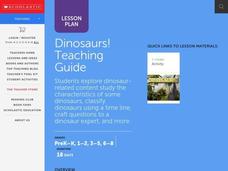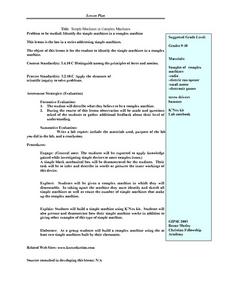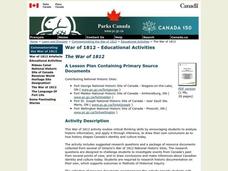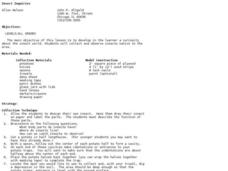Curated OER
Coffee Cooling
High schoolers explore the factors that affect how long coffee stays hot. They develop a question and a testable hypothesis for one factor such as initial temperature or size of opening of the container. Then they design and conduct an...
Curated OER
Science Lab Skills
Pupils develop problem solving, decision-making and inquiry skills by planning experiments. They conduct systematic observations, interpret and analyze data and draw conclusions then communicate their results.
Curated OER
Analysis of Grooming Behavior in Drosophila melanogaster
Students engage in a lab that focuses on animal behavior in an open ended inquiry based laboratory experience. They build an ethogram, display a transition matrix and analyze a Markov Chain. They remove wings from the drosophila and...
Curated OER
Dinosaurs
Students will develop goals for inquiry. They will also improve content area reading and research skills. The context of studying dinosaurs will help learners to distinguish from organisms that live presently and those from the past...
Curated OER
What Is The Matter?
Young scholars engage in a lesson plan about the scientific concept of matter. They use essential questions in order to guide the research process. Students engage in several class inquiries that are hands on in order to investigate the...
Curated OER
The UPS Experiment
Students calculate the speed using metric measurements. In this geometry activity, students calculate speed, distance and velocity using metric measurements. They gain inquiry and problem solving skills in this assignment.
Curated OER
Simple Machines In Complex Machines
Students brainstorm the concept of a machine. They make lists of the characteristics that all machines share. The teacher uses questioning in order to get students to think more deeply about the subject. They create a lab to demonstrate...
Curated OER
Inquiring Minds
Students review examples of questions that represent different levels of thinking. They then focus on the contributions of leaders from different eras and generate interview questions that a contemporary leader might ask of a...
Curated OER
Breathing is Essential to Life
Learners explore the job of the lungs. In this Human Body lesson plan, students participate in five activities in order to develop a better understanding of the lungs. Each of the activities relates to how the lungs help us breathe and...
Curated OER
The Science of Microbes (Observing Different Microbes)
Students use their observation and inquiry skills to understand microbes. In this microbiology lesson, students explore slides with a microscope. Students gain experience with preparing slides and proper use of a microscope while...
Curated OER
Cody's Science Education Zone
Students observe a scientific experiment and pose a hypothesis. In this scientific inquiry lesson, students make predictions about the combination of alcohol in water and how it will affect a floating ice cube.
Curated OER
The War of 1812
Students research the War of 1812 as it affected Canadian history. They research primary source documents that are listed at the include websites. They answer the associated research questions.
Curated OER
Climate Change
In these science worksheets, 5th graders explore aspects of weather and recycling. In the first worksheet, students are given five questions about weather which they match to the statement about weather that corresponds to it. In the...
Curated OER
The Blue Bottle: An Example of Teacher-Guided Inquiry
Learners observe a demonstration in which a bottle containing a colorless solution is mixed, turns blue, then becomes colorless again. They record observations, form and discuss hypotheses, and draw a conclusion based on the evidence.
Curated OER
Archaeological Inquiry
Students describe what they see as they observe an "artifact". They draw conclusions based on the information gathered to identify what the artifact might be used for and determine how old it might be.
Curated OER
Scientific Inquiry
Learners create a poster. In this recycling lesson, students discuss pollution and the ways humans negatively affect the environment. Learners describe examples of litter or pollution they have experienced. Students collect litter from...
Curated OER
Galactic Inquiry
High schoolers view NASA images of galaxies and develop a galaxy classification scheme. They compare and contrast their classification scheme with that developed by Edwin Hubble. They recognize that galaxies are collections of billions...
Curated OER
Insect Inquiries
Students explore the topic of insects. In this biology lesson plan, students develop a curiosity about the insect world. Students will collect and observe insects native to the area.
Curated OER
Science as Inquiry: what is starch and how can we test it?
Sixth graders discuss nutrients and examine foods for starch. In this starch testing lesson plan, 6th graders use iodine to test foods for starch and record their results. Students complete a worksheet and self reflection.
Curated OER
To Float or Not to Float, That is the Question?
Ninth graders develop operational definition of density, do computations using density equation, categorize pieces of matter as being able to float on
water or not, based on density, explain why some objects sink or float based on...
Curated OER
Scientific Inquiry 3
In this lesson, 6th graders research and examine current theories behind the mass extinction of dinosaurs. After a discusion about the extinction of the dinosaurs, students discuss the two major extinction theories talked about in the...
Curated OER
All About Blood and the Heart (Human Body for Children)
In this anatomy instructional activity, students learn about the heart and it's characteristics. Students monitor their heartbeat in an experiment and then answer a series of questions about what they found.
Curated OER
Using technology to engage students in science through inquiry research
Students study animals and their behaviors. In this animal behavior lesson plan students divide into groups and collect data and research animal behaviors.
Curated OER
Inquiry and the Nature of Science
Students identify questions that can be answered through scientific investigations, design and conduct a scientific investigation. They also use appropriate tools and techniques to gather, analyze, and interpret data.























